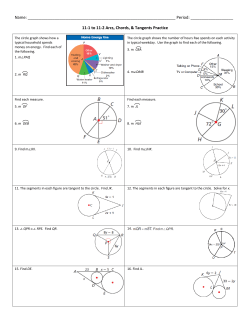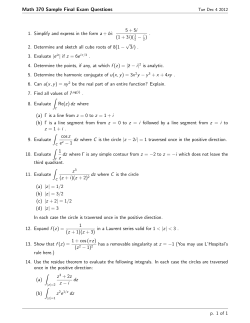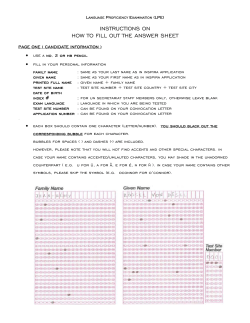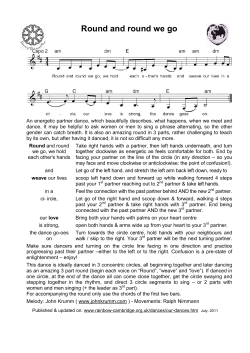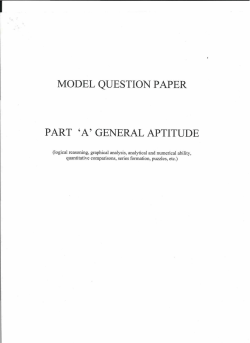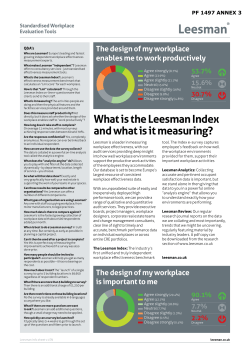
Handling Difficult Situations! (or how to improve working relations)
RCN Corporate Training Programme Handling Difficult Situations! (or how to improve working relations) Facilitator: Ian Govier opportunitynowhere ctr Setting the Context „The most important single ingredient in the formula of success is knowing how to get along with people.‟ Theodore Roosevelt „We humans are social beings. We come into the world as the result of others' actions. We survive here in dependence on others. Whether we like it or not, there is hardly a moment of our lives when we do not benefit from others' activities. For this reason it is hardly surprising that most of our happiness arises in the context of our relationships with others.‟ The Dalai Lama The first rule: There is no such thing as a difficult person, there are just people we need to learn how to deal with... The second rule: Re-read the first rule... There is no quick fix or magic wand that changes the behaviour of others. The primary causes of workplace conflict are seen as personality clashes and warring egos (49%) 27% of employees have seen conflict lead to personal attacks, and 25% have seen it result in sickness or absence Majority of employees (85%) have to deal with conflict to some degree and 29% do so „always‟ or „frequently‟ Seven out of ten employees (70%) see managing conflict as a „very‟ or „critically‟ important leadership skill One in eight employees (12%) say that disagreements among their senior team are frequent or continual The average employee spends 2.1 hours a week dealing with conflict. For the UK alone, that translates to 370 million working days lost every year as a result of conflict in the workplace Conflict at work: „any workplace disagreement that disrupts the flow of work‟ The Manager's Code of Conduct (Management Advisory Service, 2010) In terms of handling difficult situations, what do I want to ACHIEVE or CHANGE as a result of today’s workshop? What do we really mean when we use the term „handling difficult situations‟? When handling difficult situations, we can’t choose the other person’s response. What we can do is… INFLUENCE their response The door to INFLUENCE opens from the inside Between what happens to us and our response to it… …..is our freedom to choose our response Why bother to choose (and control) your response? CYW It‟s Not About You, It‟s About Them Freedom of Speech Anger Feeds Anger. Negativity Feeds Negativity Battle of the Ego Negativity Spreads Waste of Energy Hurting Ourselves Everyone thinks of changing the world, but no one thinks of changing themselves! “If you want to see change… …be the change you want to see” What do you notice about Difficult People? IGV Different Types of „Difficult‟ People (Mannering, 2008) • Aggressive people • Know-it-alls • Selfish people • Negative people • Passive people & passive-aggressives • Overly accommodating people • Insecure people • High maintenance people How do you usually handle Difficult People? How do I usually handle difficult people? The ABCs of Handling Difficult Situations (Thomas and Kilmann) Avoiding when the situation is not addressed and avoided until later or all together. Accommodating when one person lets the other get their way. Bargaining (Compromise) when the people involved come to an agreed upon solution where sacrifices are made by both or all. Competing when one person wants to have their way and not allow for a compromise. Collaborating when everyone involved comes to a solution and all needs are addressed. How can you deal more effectively with Difficult People? A Twelve-point Toolbox These are general techniques for handling difficult situations / people: 1. Don‟t take it personally, or get personal 2. Plan for emotion, it is only natural 3. Listen, acknowledge, validate 4. Be calm and assertive 5. Put the onus on yourself 6. Leave them the bus fare home (i.e. leave them their dignity) 7. Make a break – change your body language 8. Take ten – call for a break if things become heated 9. Own your feelings 10. Levelling technique – level out the balance of power 11. Know the “rules” in your workplace 12. Stay positive The Emotional Bank Account The Emotional Bank Account Deposits Withdrawals • Seek first to understand. • Show kindness, courtesy, • Assume you understand. • Show unkindness, respect. • Keep promises. • Be loyal to the absent. • Set clear expectations. • Apologize. • Give feedback (“I” messages). • Forgive. discourtesy, disrespect. • Break promises. • Be disloyal, badmouth. • Create unclear expectations. • Be proud and arrogant. • Give no feedback or evaluate character (“you” messages). • Hold grudges. How am I already thinking or acting differently as a result of today‟s workshop? for handling difficult situations / people The first rule: There is no such thing as a difficult person, there are just people we need to learn how to deal with... The second rule: Re-read the first rule... Think „WIN-WIN‟ The Courage and Consideration Grid Habit 4 Think Win-Win Win-Lose Win-Win Lose-Lose Lose-Win 56 Think „WIN-WIN‟ V The „Win-Win‟ Process: See the problem from the other point of view, in terms of the needs and concerns of the other party. Identify the key issues and concerns (not positions) involved. Determine what results would make a fully acceptable solution. Identify new options to achieve those results. The ‟DESC‟ technique for creating: & D escribe the situation The E xpress how you feel ‘DESC’ S pecify what you want Script C onsequences which will result (negative & positive) 4 Key Questions • What facts do you know based on what you actually saw, heard, or read? • What inferences or conclusions do you draw from the facts? • How do the inferences or conclusions make you feel (without blaming or judging anyone)? • What needs do you now have (without blaming or judging) because of the information you related above? Circle of Concern Circle of Influence Circle of Concern Circle of Influence Circle of Circle of Influence Concern CO Circle of Influence Group Exercise Let‟s Nail It! Group Exercise God grant me the serenity to accept the things I cannot change; the courage to change the things I can; and the wisdom to know the difference. Using some key principles when handling DIFFICULT SITUATIONS So what is ? • Neuro – your thinking processes, the way you use your senses of sight, hearing, feeling, taste and smell to understand what is happening around you; • Linguistic – your words, the way you use language and how it influences you and those around you; • Programming – your behaviour and the way you organise your ideas and actions, which produces expected and unexpected results. Key Principles Know what outcome you want to achieve. Have a resourceful state and sufficient sensory acuity (awareness) to know if you are moving towards or away from your outcome Have sufficient flexibility of behaviour so that you can vary your behaviour until you get your outcome. Take action now! Key Principles Outcome Knowing what you want Acuity Notice what you are getting Flexibility Keep changing what you are thinking & doing The map is not the territory There is no failure, only feedback We are where we are as a result of the choices we make Behind every action is a positive intention Some „Operating Principles‟ If you always do what you‟ve always done, you‟ll always get what you‟ve always got The meaning of a communication is the response you get It‟s not what happens to you, but what you do with it that determines your experience Perceptual Positioning Video = ME How do I see the situation? 1st How do I see the other person? How do I feel? What‟s going on in my opinion? = THE OTHER PERSON How do I see the situation? How do I see the other person? 2nd How do I feel? What‟s going on in my opinion? = OBSERVER 3rd How do I see the situation? How do I see these 2 people? What do I think is going on? What might 1st position do to change things? None of us is as smart as all of us! A „speed mentoring‟ approach to handling difficult situations Using Incisive Questions (Nancy Kline) The POWER to change! Helping yourself and others create „well-formed outcomes‟ Outcome Knowing what you want Acuity Notice what you are getting Flexibility Keep changing what you are thinking & doing POWER Outcomes Ask: P O ositive Is this within your own control? wn part W E hat specifically cology R What would you rather have? eal What specifically do you want? With whom? By when? If you could have that tomorrow, would you take it? If you get hesitation Ask: “what stops you?” Can you imagine how it will be when you have achieved your goal? See, hear, feel.. Diagnostic Questions? • What stops you from… (outcome)…? Listen to their reply, and ask yourself… is that a thought, action, belief or emotion? • What would have to happen for you to be able… (outcome)…? Listen for thought, action, belief, emotion. • Test your hypothesis by asking… “If you could have a more useful thought / action / belief / emotion, would that make a difference?” Recipe for Fielding Challenges Acknowledge Clarify Answer Check When things go off track! Summarise Final Thoughts ctr Done! Workshop Evaluation / Feedback If we always do what we‟ve always done… …we‟ll always get what we‟ve always got! What will I do differently as a result of today‟s workshop? The first rule: There is no such thing as a difficult person, there are just people we need to learn how to deal with... The second rule: Re-read the first rule... opportunitynowhere www.ctrtraining.co.uk/resources.php
© Copyright 2025

